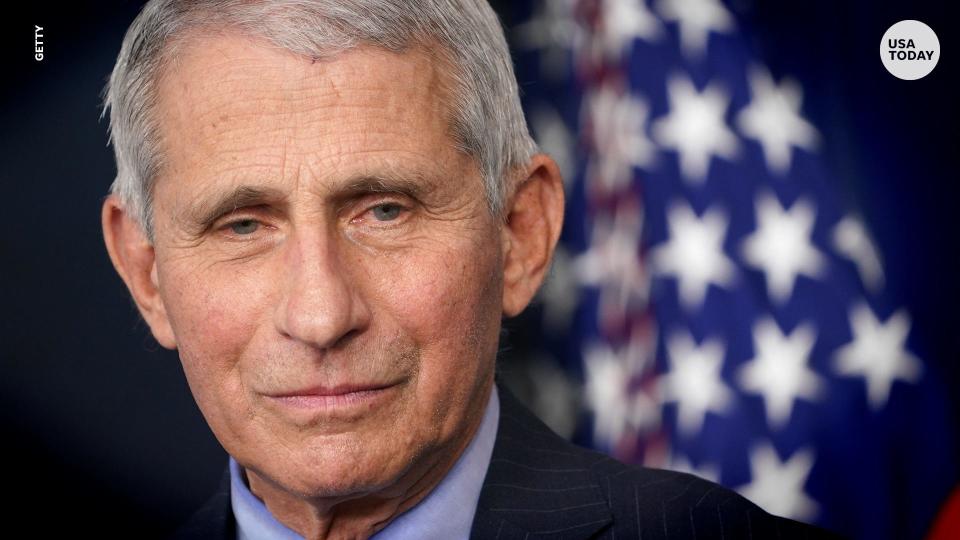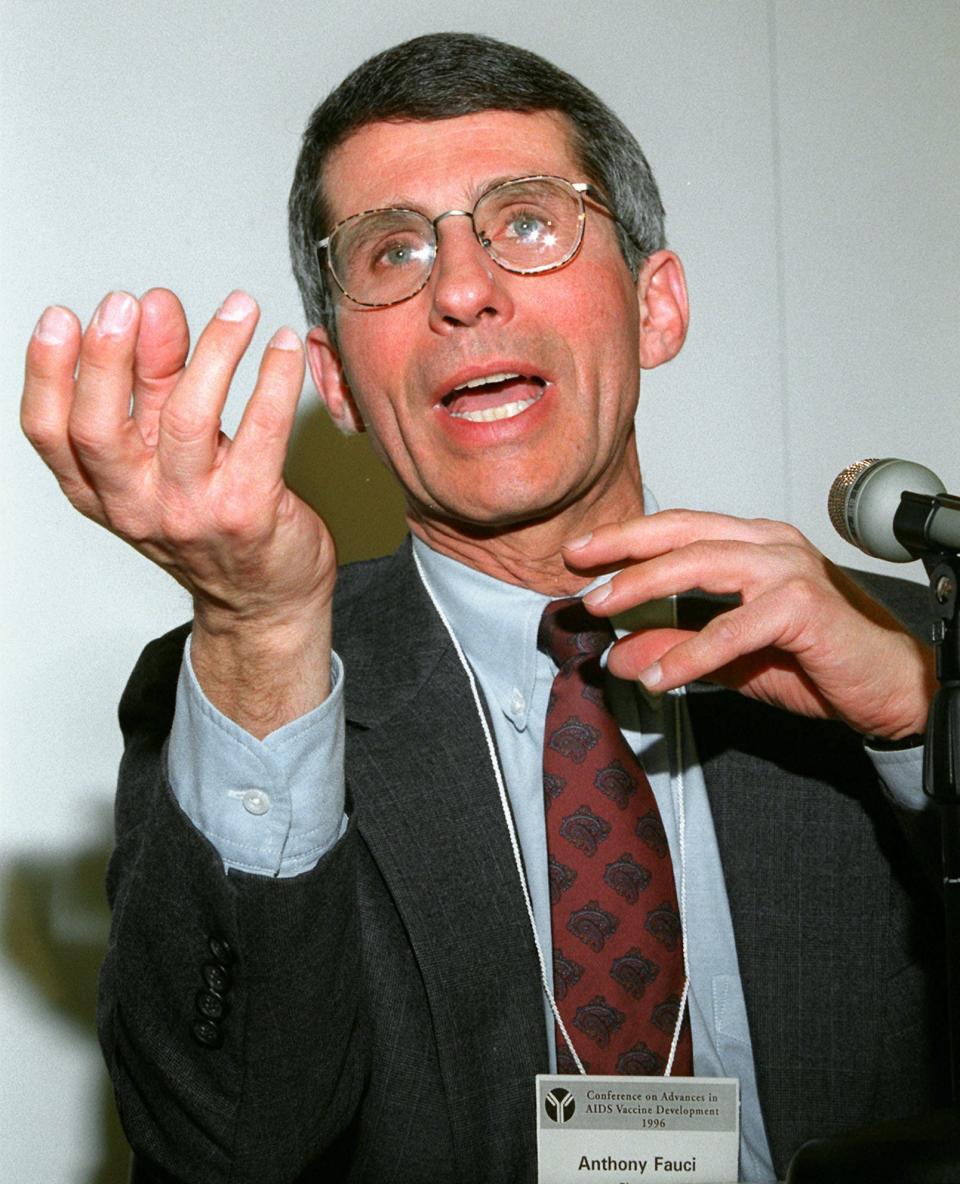Dr. Anthony Fauci didn't just treat infectious diseases, colleagues say. He 'served the public for 50 years.'
- Oops!Something went wrong.Please try again later.
Dr. Anthony Fauci, who emerged as the nation's most influential voice during the COVID-19 pandemic, remained focused on preventing and treating the world's deadliest viruses during his 54-year public health career despite pointed political attacks.
That's how colleagues and other health professionals will remember his tenure as the nation's top infectious disease doctor.
Fauci, 81, announced Monday that he would step down in December as director of the National Institute of Allergy and Infectious Diseases, and as President Joe Biden's top medical adviser. He said he was not retiring and would pursue "the next phase of my career while I still have so much energy and passion for my field."
His department's work has been instrumental in the prevention, diagnosis and treatment of a stream of developing infectious diseases – including Ebola, dengue, West Nile and Zika – but none of more sweeping impact or public interest than HIV/AIDS and COVID-19.
Fauci became a household name during the COVID-19 pandemic, with T-shirts, bobblehead dolls and coffee mugs sprouting his likeness during a difficult and often frightening period. His work generated praise from the public health community and attacks from critics and political opponents in a nation sharply divided over how to handle a once-in-a-century virus that has killed more than 1 million Americans and disrupted everyday life.

"He, unfortunately, is, I think, a victim of the increasing polarization and partisanship that has infected the COVID response in the U.S.," said Dr. Tom Frieden, a former Centers for Disease Control and Prevention director who now heads a group called Resolve to Save Lives.
Fauci served on then-President Donald Trump's coronavirus task force and was often featured in televised press conferences in 2020 when shutdowns, social distancing, mask wearing and frequent testing aimed to slow the spread of COVID-19.
THE PANDEMIC ISN'T OVER: U.S. stuck in a 'horrible plateau' of COVID-19 deaths, experts say. Here's why.
While Trump promoted non-evidence-based treatments such as hydroxychloroquine, Fauci often countered with the latest scientific evidence as new treatments emerged.
His work has continued as President Joe Biden's top medical adviser.
"Because of Dr. Fauci’s many contributions to public health, lives here in the United States and around the world have been saved," Biden said in a White House statement Monday. "As he leaves his position in the U.S. government, I know the American people and the entire world will continue to benefit from Dr. Fauci’s expertise in whatever he does next."
Dr. Anthony Fauci, through the years: From NIH to presidential adviser
Fauci joined the National Institutes of Health in 1968, led its National Institute of Allergy and Infectious Diseases division since 1984, and has served as an adviser to the past seven presidents and their administrations.
Fauci has been a key researcher in HIV/AIDS since it was discovered in 1981, studying how the disease destroys the body’s defenses and how to develop therapies and prevention tools. He served as an architect of the President’s Emergency Plan for AIDS Relief, launched in 2003 during the George W. Bush administration. To date, the plan has contributed nearly $110 billion to treatment and prevention, earned bipartisan support and protected millions of babies from being infected with HIV in what was "probably the single best thing for American diplomacy," over the past two generations, Frieden said.
The longtime chief of the NIAID’s Laboratory of Immunoregulation, Fauci is one of the most frequently cited researchers in medical academic research papers, having authored, co-authored or edited more than 1,400 scientific publications.
Dr. Marc Siegel: Dr. Anthony Fauci knows he's made 'a lot of enemies.' Here's what I know about him.

Fauci’s leadership and communication have always been “science-based, gracious, extraordinarily clear and offered with great diplomacy,” said Dr. William Schaffner, an infectious disease specialist at the Vanderbilt University School of Medicine in Nashville, Tennessee.
Fauci's enlightened leadership, Schaffner said, was critical to a public health community that found itself under incredible strain and sometimes attack.
“Tony was our guide star in all of this, modeling what many of us did locally in our own communities in attempting to educate and implement public health measures,” he said.
HOW DOES COVID-19 AFFECT ME? Don’t miss an update with USA TODAY’s free Coronavirus Watch newsletter.
AN UNEASY PARTNERSHIP: A timeline of President Donald Trump's and Dr. Anthony Fauci's relationship.
Fauci’s calm demeanor and measured presentations were especially important in the first two years of the pandemic, when misinformation was rife. Many Republicans, including Trump, clashed with Fauci and were less than supportive of science-based interventions.
“During a period of extraordinary crisis, he showed great precision, firmness and diplomacy," Schaffner said. "He had to interact with a political leadership that found it difficult to understand the scientific basis of the pandemic, and as a consequence had difficulty recommending and implementing a public health response."
Within weeks of the virus emerging in China and researchers there sharing its genetic sequence, the NIH and Fauci's department in January 2020 issued grants to drugmakers, which led to development of vaccines that were shipped globally.
People who know science were impressed with Fauci’s record long before the COIVD-19 pandemic, said David Rubenstein, co-chairman of the private equity firm Carlyle Group and former chairman of the Duke University Board of Trustees.
“When history is written, he will be considered to be one of the most prominent people in the history of our country’s efforts to deal with infectious diseases such as HIV and COVID,” Rubenstein said. “He had enormous impact because he was courageous and willing to stand up to people who were trying to say things that were politically popular but not based in science.”
Republicans lash out on Twitter: 'He got everything so wrong for so long!'
While the scientific, medical and public health community lauded Fauci’s more than 50 years of public service, acting as a scientific adviser to every U.S. president since Ronald Reagan, he was reviled and attacked by many Republicans.
On Monday, Donald Trump Jr. tweeted, “Dr. Anthony Fauci, the US's top infectious disease expert who has seeming been wrong about everything since the AIDS epidemic, says he will retire by the end of the year likely to avoid being questioned by a GOP controlled house on how he got everything so wrong for so long!”
Texas Sen. Ted Cruz tweeted, “In January, a GOP Congress should hold Fauci fully accountable for his dishonesty, corruption, abuse of power, and multiple lies under oath. Never in our nation’s history has one arrogant bureaucrat destroyed more people’s lives.”
TRACKING COVID-19 VACCINE DISTRIBUTION BY STATE: How many people have been vaccinated in the U.S.?
Fauci faced tremendous political pressure and attacks due to COVID-19, including numerous death threats.
Sen. Rand Paul of Kentucky was especially vociferous. In multiple exchanges during congressional hearings, Paul erroneously claimed Fauci improperly received money from vaccine makers, incorrectly characterized Fauci’s statements about COVID-19 vaccines, and accused him of lying about the origins of the virus.
In December, a man was arrested in Iowa while authorities say he on his way from California to Washington, D.C. He carried an assault rifle and ammunition and had a hit list that included Biden and Fauci, officials say.
Dr. Jerome Adams: 'He's going out in the middle of a war in many ways'
Dr. Jerome Adams, surgeon general under Trump and now director of health equity at Purdue University, served with Fauci on the White House Coronavirus Task Force. He was dismayed by the conversation on Twitter on Monday.
“Unfortunately, he’s going out in the middle of a war in many ways, a political war, a war against the virus and a war really for the soul of our country,” Adams said. “It’s remarkable that you can send a message on Twitter saying thanks Dr. Fauci and you truly get the most hateful comments back, that this 81-year-old man who has served the public for 50 years has terrible things said about him.
“I hope with time people can reflect on Dr. Fauci’s service to this country, that even if they don’t agree with what he did during COVID, they can appreciate the contributions he’s made over 50 years of federal service for science and health.”
WHEN SHOULD I GET A COVID BOOSTER? Next-generation antibody tests could help.
Adm. Brett Giroir, who oversaw the Trump administration's COVID-19 testing efforts and served with Fauci on the White House task force, disagreed with some Fauci recommendations, but said Fauci was always respectful and professional.
"I never saw Tony, even in private, being disrespectful to the president (Trump)," said Giroir, the former assistant secretary for health. "And there were plenty of opportunities that he could have been."
When Frieden directed the CDC during the Obama administration and the agency was criticized over its handling of the Ebola virus, Fauci defended the rival agency.
"We were getting badly beaten up, internally and externally," Frieden said. "He stood up for us and I can't quite convey how unusual that is for one leader in one agency to stand up for another agency. It's just different from the way most people behave."
Ken Alltucker, Elizabeth Weise and Dinah Voyles Pulver are on USA TODAY's health, science and climate team. They can be reached via email at alltuck@usatoday.com; eweise@usatoday.com and dpulver@gannett.com, or on Twitter at @kalltucker, @eweise and @dinahvp.
This article originally appeared on USA TODAY: How Dr. Anthony Fauci's 'service to this country' will be remembered

